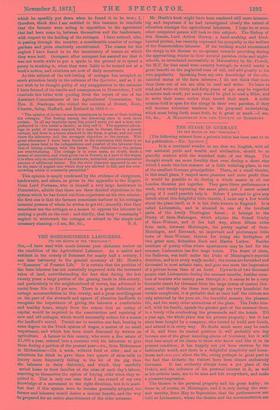THE SOMERSETSIIIRE LABOURERS. ero THE EDITOR OF THE "SPECTATOR.") •
SIR,-I have read with much interest your elaborate review on the condition of the Agricultural Labourer. As a native and resident in the county of Somerset for nearly half a century, I can bear testimony to the general accuracy of Mr. Heath's "'Romance' of Peasant Life." It is certain that the position of the farm labourer has not materially improved with the increased value of land, notwithstanding the fact that during the last twenty years a large portion of the grazing lands in this county, and particularly in the neighbourhood of towns, has advanced in rental from 30s. to 13 per acre. There is a great deficiency of -cottage accommodation in this county, and a great unwillingness on the part of the stewards and agents of absentee landlords to recognise the importance of giving the labourer a comfortable and healthy home, simply from the reason that an outlay of capital would be required in the construction and repairing of new and old cottages, which would necessarily reduce for a season the landlord's rental. Permit me to mention one fact, bearing in some degree on the Truck system of wages, a matter of no small importance, and which has been much discussed by writers on agriculture. A farmer in this county, who rents a fine estate of £1,000 a year, entered into a contract with his labourers to give them during a portion of the present year—viz., from Midsummer to Michaelmas-15s. a week, without food or cider ; and as a substitute for drink he gave them two quarts of skim-milk (a luxury more frequently falling to the lot of the pig than she labourer in dairy districts), and which they carefully arried home to their families at the close of each day's labour, reserving to themselves the option of buying cider when they re- quired it. This is only one case that I can record of my own knowledge of a movement in the right direction, but it is mani- fest that if this system were to become generally adopted, the farmer and labourer would derive a mutual benefit, and the way be prepared for an entire abandonment of the cider nuisance. Mr. Heath's book might have been rendered still more interest- ing and important if he had investigated closely the extent of education amongst the agricultural labourers. I hope he or some other competent person will look to this subject. The Bishop of this diocese, Lord Arthur Hervey, a hard-working and kind- hearted prelate, has recently expressed his sympathy in the welfare of the Somersetehire labourer. If his lordship would recommend the clergy in his diocese to co-operate towards providing during the approaching winter in their several parishes clubs and night- schools, as introduced successfully at Malmesbury by Mr. Powell, the M.P. for that small west-country borough, he would confer a great benefit on the neglected sons of toil, and add greatly to his own popularity. Speaking from my own knowledge of the edu- cational status of the farm labourer, I do not think that more than three out of ten are able to read and write. To learn to read and write at thirty and forty years of age may be regarded as severe task-work, yet many would be glad to read a Bible, and to write their name rather than record their mark. A noble mission-field is open for the clergy in their own parishes, if they will become volunteer teachers in the proposed undertaking, which must bring forth some fruit, be it great or small.—I am, Sir, &c., A MAGISTRATE FOR THE COUNTY OF SOMERSET.


































 Previous page
Previous page